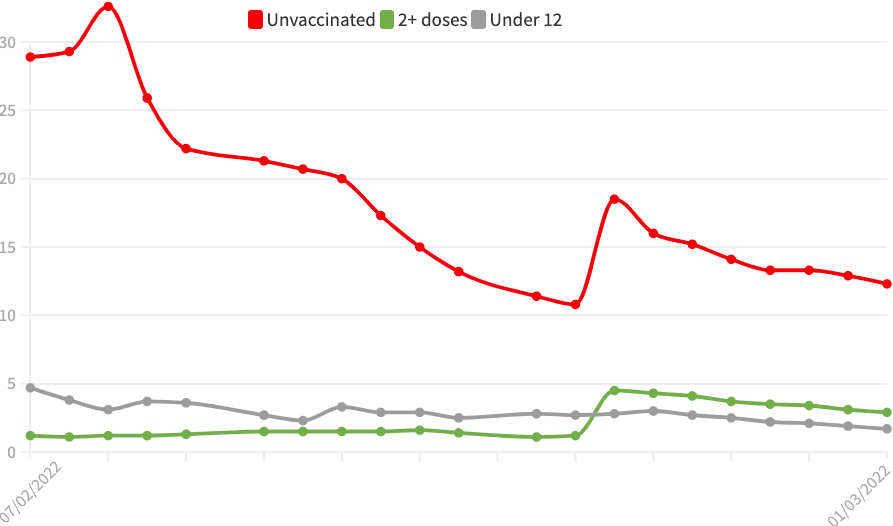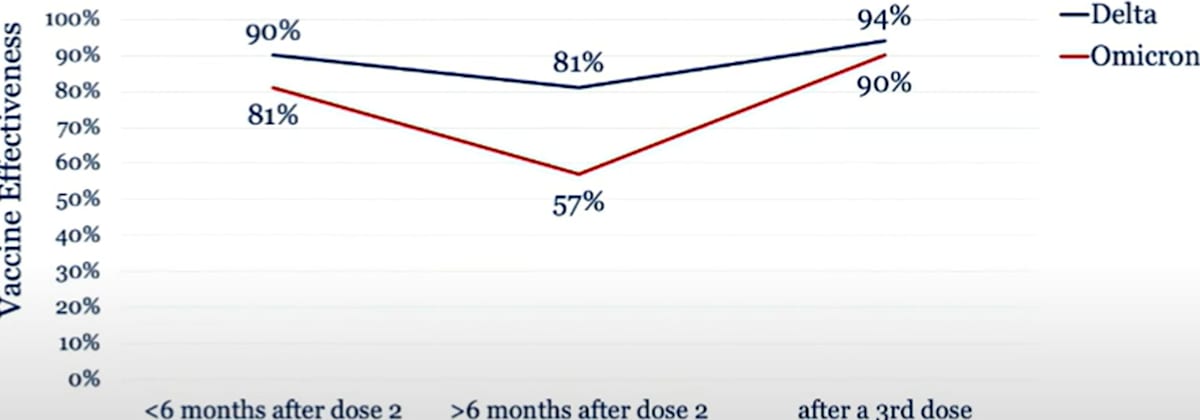
Leaders of a group challenging vaccine mandates this week include a GP suspended for distributing misinformation, and an anti-abortion activist who compares vaccination to the Nazis' Final Solution.
Frustrated by a High Court judge's scepticism about the efficacy of vaccines in slowing Omicron transmission, Crown lawyers are expected to present him with updated scientific evidence in a new court case this week.
The Ministry of Health is highlighting three big new studies from the US Centers for Disease Control and Prevention that show the Pfizer and Moderna vaccines, with boosters, reduce the transmission of Omicron by 67-82 percent.
That's only now being reflected in New Zealand statistics, which until last week didn’t distinguish between case rates for those who have just two doses, and those who are boosted. It's the latter that makes all the difference against Omicron – to the extent that the vaccine mandate has been extended to include boosters for health, education, prisons and border workers.
Those data gaps meant that last week, High Court Justice Francis Cooke found that vaccination was of limited efficacy in slowing the transmission of Omicron. He noted that he had been presented with "emerging information in relation to the Delta and Omicron variants", by the applicants' expert witness Dr Nikolai Petrovsky from Flinders University, and the Ministry’s Chief Science Adviser, Professor Ian Town.
Neither specialist said that vaccines were ineffective in reducing the transmission of Omicron but, nonetheless, Justice Cooke found that the vaccine had "significantly lower" effects in limiting infection and transmission than was the case with earlier variants. "I accept on the basis of Dr Town’s evidence that vaccination might contribute to preventing contracting and spreading the Delta and Omicron variants to some extent, although not nearly as much as it did against the original versions of Covid-19."
This week, the Government is determined to provide him with the latest, most robust scientific evidence to show that vaccination does serve a public good in protecting others from transmission, not just the more private good of reducing the severity of symptoms, and hospitalisations.
Cumulative hospitalisations per 100 cases since January 23

The forum will be the court challenge taken by two incorporated societies, the New Zealand Doctors Speaking Out with Science, and the New Zealand Teachers Speaking Out with Science. It is set down for a three-day hearing beginning Thursday morning at the High Court in Wellington.
The Police and Defence case was fronted by Ryan Yardley, a Detective Senior Sergeant with a solid professional reputation and a considered manner, who said his concern was about lessening discrimination. The case was argued by the military lawyer Matthew Hague who says he is himself double-vaccinated – which he cites as evidence that the case was just about the employment mandate, not about the vaccine.
By contrast, the doctors and teachers are led by a steering committee that includes a GP suspended by the Medical Council for spreading vaccine misinformation, and a Northland anti-abortion activist who compares the government pandemic response to the Nazi's Final Solution.
None could be reached for comment before publishing this article. Barrister Warren Pyke is acting for the two societies; he said he was too busy to discuss the case with media.
But Mike Shaw, the spokesman for the teachers' group, was at the Parliament occupation and streamed a 38-minute Facebook video as the protesters dissipated. He said New Zealand was "creeping further toward a totalitarian state" and promised new demonstrations outside the Ministry of Education.
He described this week's anti-mandate court case as "possibly the most history-making human rights decision in New Zealand … We're going to keep it peaceful, we're going to keep it legal and we're going to keep it positive."
Earlier, Shaw posted a statement comparing the New Zealand Government to the Nazis. He did acknowledge that, "in truth nothing can really compare to the horrors of Nazi Germany" but went on to warn New Zealanders to be on guard against totalitarianism. "The 'final solution' did not happen overnight but it was the end result of mass formation psychosis," he wrote. "In essence the pandemic has produced conditions making it possible for the government to hypnotise the country."
Crown lawyers will consider that there is little point trying to persuade those particular anti-mandate groups, which appear small. The focus in this court hearing – for both sides – will be about persuading the public.
The Government knows it needs to push back, after losing last week's High Court case challenging Police and Defence Force employment mandates. Rather than quickly appealing, or indeed conceding to the successful court applicants' calls to announce an end to mandates, Crown lawyers will put their energy into arguing the science better this week.
Justice Francis Cooke accepted last week that two doses plus a booster of mRNA vaccines such as the Pfizer-BioNTech one were proven highly effective in reducing the severity of illness. But he was unconvinced that they sufficiently slowed the transmission of Omicron to provide a public good of a magnitude that justified impinging on individuals' employment rights.
The Ministry of Health is now highlighting three newly published studies from the US Centers for Disease Control. Dr Ashley Bloomfield, the Director-General of Health, says those studies now confirm the vaccine protects against infection. "And it’s hard to pass the virus on if you’re not infected in the first place."
"And this is quite profound," he adds, preempting the legal arguments. "One of the studies, which was published in the Journal of the American Medical Association, shows that compared with being unvaccinated, the odds of contracting Omicron after receiving three doses dropped by 67 percent – two thirds – and for Delta, the risk declined by a stunning 93 percent."
That study looked at people who tested positive for Covid-19 from December 10 to January 1 at more than 4,600 testing sites across the US.
It found three shots of the Pfizer or Moderna vaccines were about 67 percent effective against Omicron-related symptomatic disease compared with unvaccinated people. Two doses, however, offered no significant protection against Omicron when measured several months after completion of the original series, the researchers found.
“It really shows the importance of getting a booster dose,” said the CDC’s Emma Accorsi, the study’s lead author.
Bloomfield agrees: "So yes, three doses of the vaccine doesn’t just protect from hospitalisation and death; it protects people from being infected by Omicron in the first place. So a highly boosted population here will serve us all well."
In the Police and Defence mandates case, the Ministry of Health's Chief Science Adviser Professor Ian Town was fronted up on his own to explain the science of vaccination. Now, ministers and officials know they will need to support him with a robust backline of independent medical experts, from NZ and around the world. They don't want to lose again.
The CDC has published two more studies this year that echo previous research – including studies in Germany, South Africa and the UK – acknowledging available vaccines are less effective against Omicron than earlier variants of the coronavirus. But they also find that booster doses strengthen virus-fighting antibodies to increase the chance of avoiding symptomatic infection.
The first study looked at hospitalisations and emergency room and urgent care centre visits in 10 states, from August 2021 to January 2022. It found vaccine effectiveness was best after three doses of the Pfizer or Moderna vaccines in preventing Covid-19-associated emergency department and urgent care visits. Protection dropped from 94 percent during the Delta wave to 82 percent during the Omicron wave.
Protection from just two doses was lower, especially if six months had passed since the second dose.
The second study focused on Covid-19 case and death rates in 25 states from the beginning of April to the end of December last year. People who were boosted had the highest protection against coronavirus infection, both during the time Delta was dominant and also when Omicron was taking over.
The High Court hearing, beginning Thursday morning, is set down for three days. In between comparing the Government's pandemic response to the Final Solution and posting streaming video from the dissipation of the Parliamentary protest yesterday, Mike Shaw explained the rationale behind their court challenge.
It was, he told supporters as he pleaded on Facebook for their $20 donations, "to sway public opinion towards revoking the mandates".
On that much, he and the Government may agree. Winning or losing this High Court case may have very little legal impact on health and education employers – but it will be influential in the court of public opinion.
Vaccine effectiveness against hospitalisation: Two doses v booster








